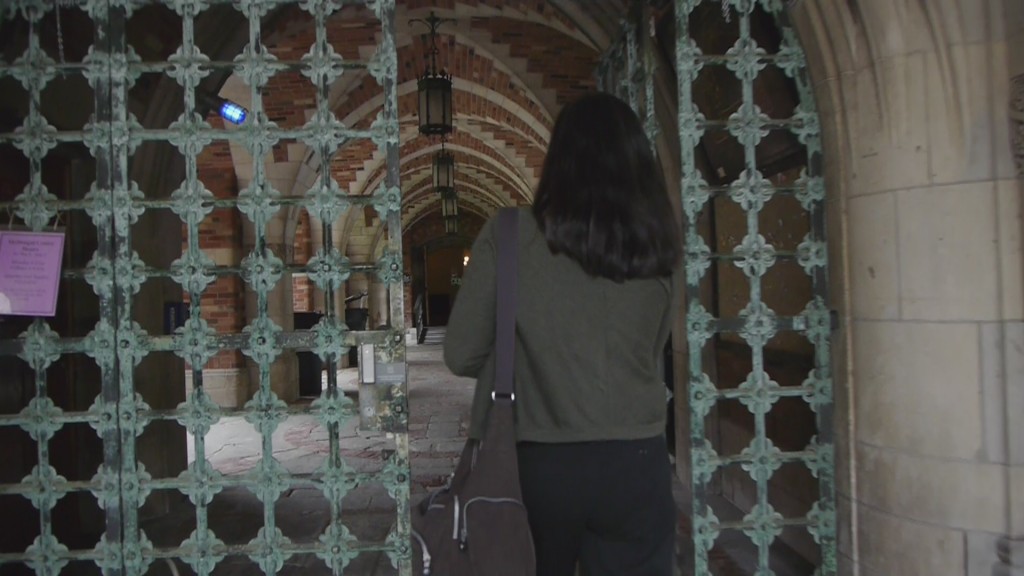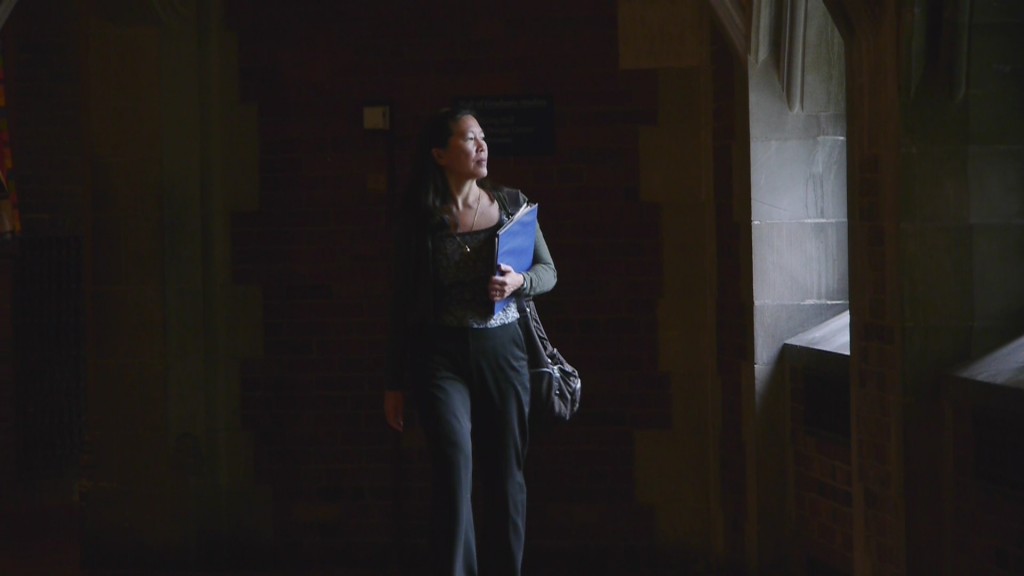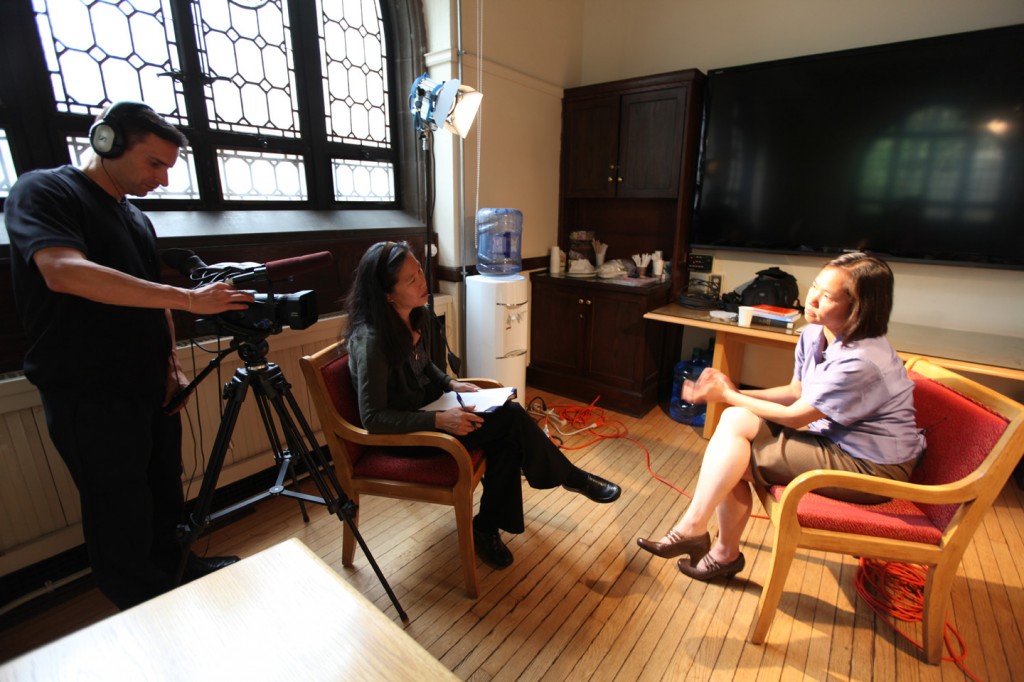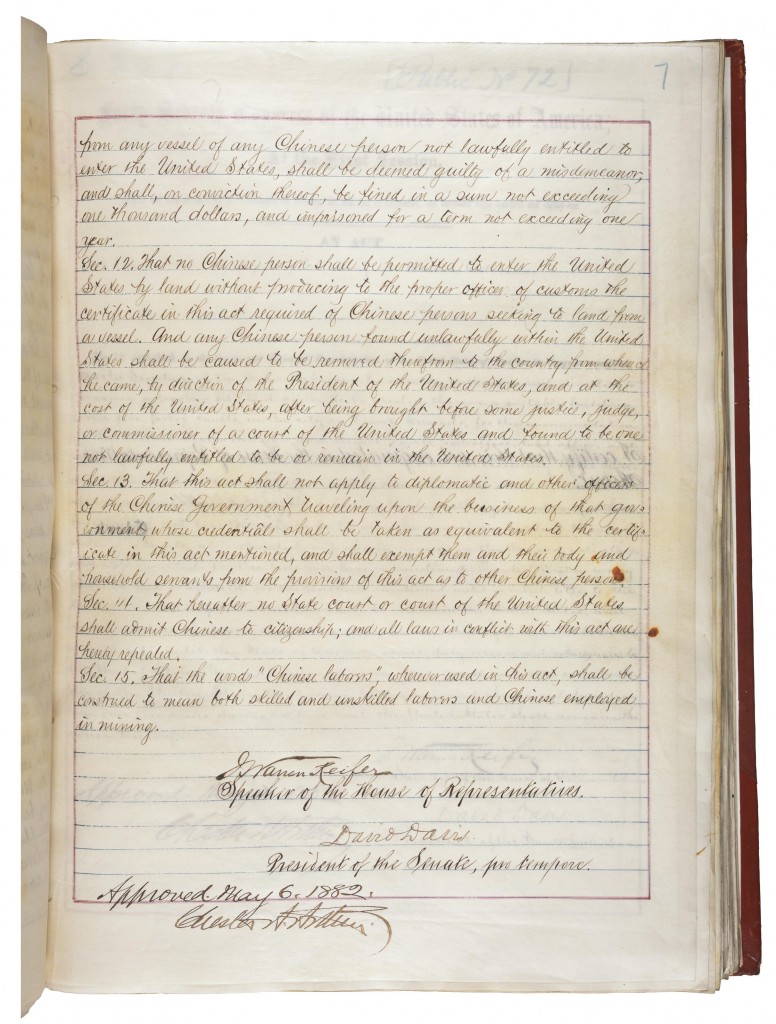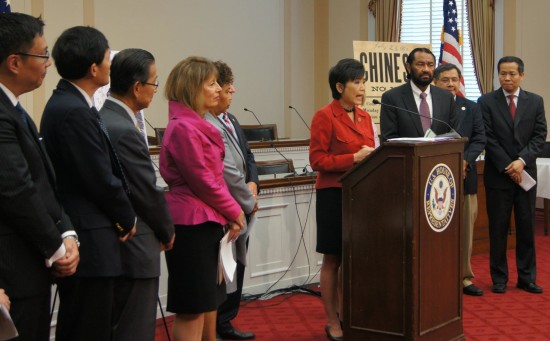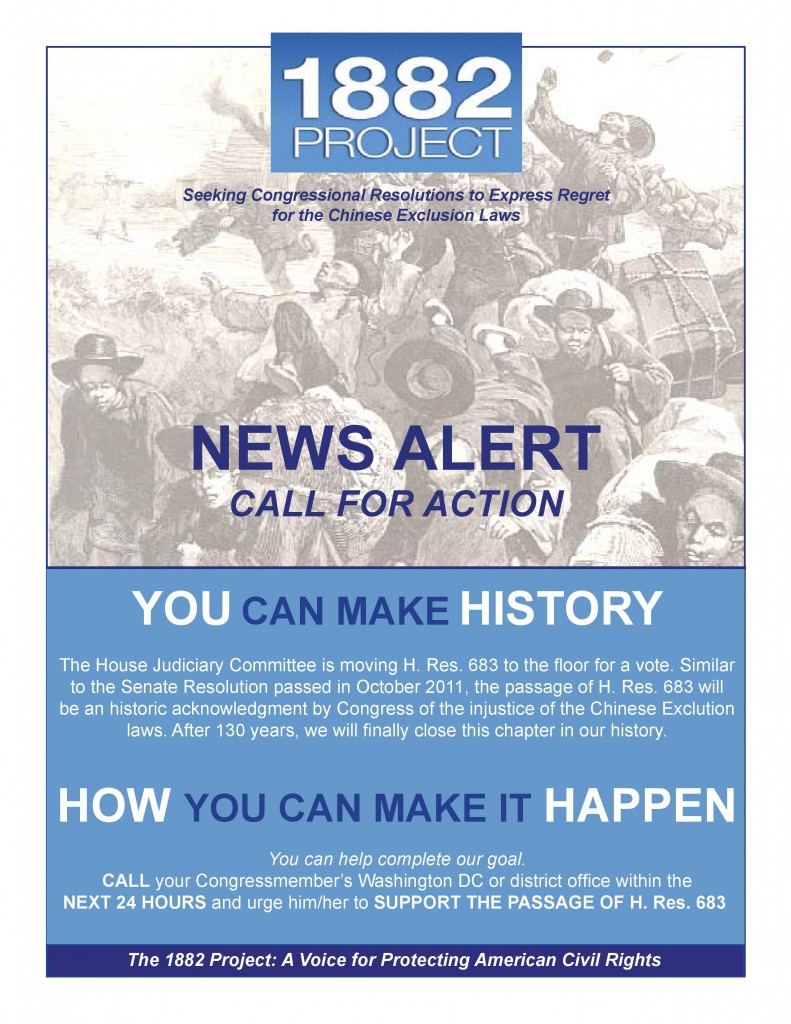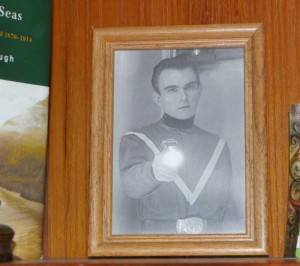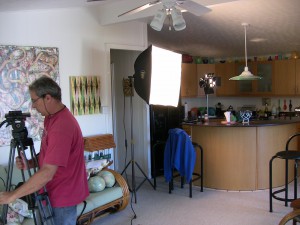Upcoming Screenings:
no event
Follow us on Facebook
HELP BRING FINDING KUKAN TO CLASSROOMS
Sign up for our mailing list.
Category Archives: Producer Robin Lung
June 28, 2012 — A Visit to Yale and Chinese Exclusion
The recent FINDING KUKAN shoot at Yale University brought out the perpetual student in me. You can’t help but be awed by the vaulted ceilings and Knights of the Round Table atmosphere of the Hall of Graduate Studies where my interview with Yale Professor of American Studies Mary Lui took place.
The building reminds you how much history has come before you and how much you are ignorant of.
Fortunately the halls of learning at Yale are populated by people like Mary who dedicate their lives to gathering knowledge and disseminating it to people like me.
In trying to understand the social climate that prompted Li Ling-Ai and Rey Scott to risk money and life to make KUKAN, Mary Lui reminded me that the behavior of Chinese Americans like Li Ling-Ai was still governed in part by prejudicial immigration laws enacted against the Chinese — the most infamous one being the Chinese Exclusion Act passed in 1882.
Meant to keep cheap labor from entering the US, the exclusion laws ended up doing much more than that. From restricting the formation of Chinese families, to rendering the few Chinese women around at the time exotic creatures with questionable backgrounds the Exclusion Laws had negative repercussions on even the richest and most educated Chinese Americans. It’s no wonder that with so few Chinese Americans around that stereotypes and misconceptions about them would form.
I came back to Hawaii much better prepared to appreciate the historic bill recently passed by Congress to officially apologize for the prejudicial laws that targeted Chinese and other Asians in America for over 80 years.
One of the stereotypes I had about my own ethnic background was that Chinese don’t make waves and passively accept their fate, letting bygones be bygones.
The courageous efforts of people like Congresswoman Judy Chu and organizations like the 1882 Project belie that stereotype and bring a new validation to the history of Asians in America that will hopefully prompt more stories about an era of exclusion that we still don’t know enough about.
Are there ways that exclusion laws have affected your life? Let us hear from you.
January 30, 2012 — Georgia Remote Shoot
I got goose bumps when I first saw Michelle Scott’s paintings on her webpage two years ago, and I’ve been a fan of her work ever since. Since my discovery of KUKAN, Michelle has been using her grandfather Rey Scott’s China photographs in her paintings.
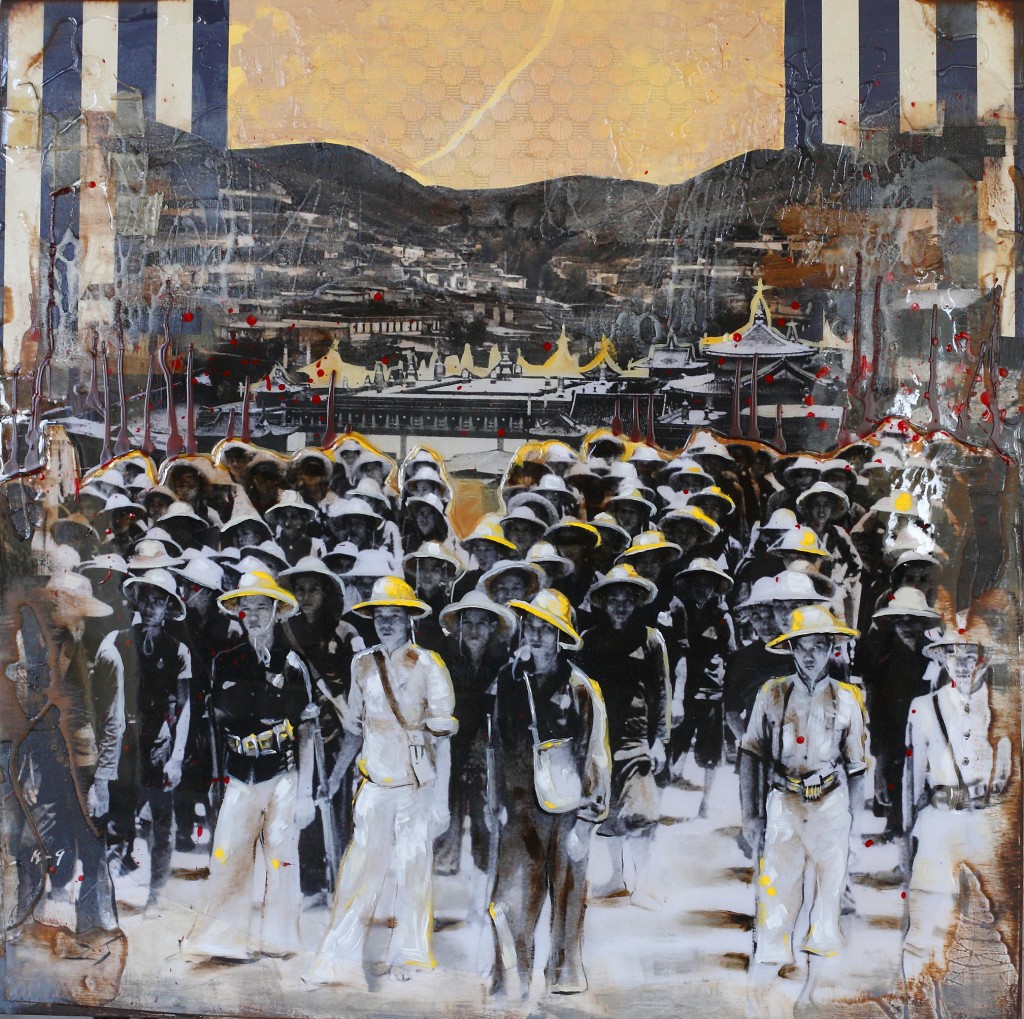
“Battle Cry” by Michelle Scott
Recently she created a couple of exciting new paintings for a group show at 2Rules Fine Art Gallery that will open on February 3rd in Marietta, Georgia. While seated at my desk in Hawaii, I was able to interview Michelle about that process with the help of Skype and Atlanta DP Wes Browning of Sema Films.
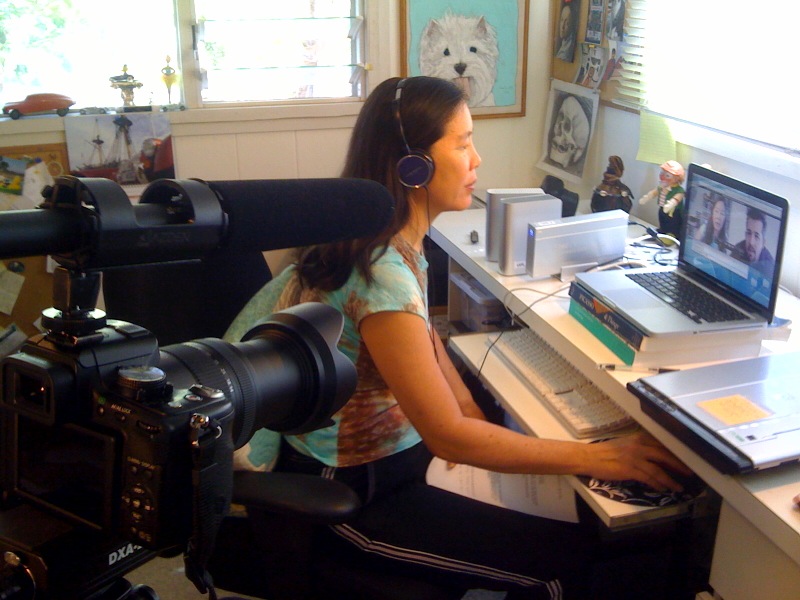
Director Robin Lung conducts Skype interview from Hawaii.
Wes also got some nice shots of Michelle putting some final touches on her paintings before delivering them to 2Rules. Wes and Skype facilitated another virtual meeting and interview with gallery owner Becky Rule. Of course I would have loved to do be there in person for it all, but I’m thankful that Skype and Wes allowed me to be a virtual part of it. Here are some photos Wes took of the shoot.
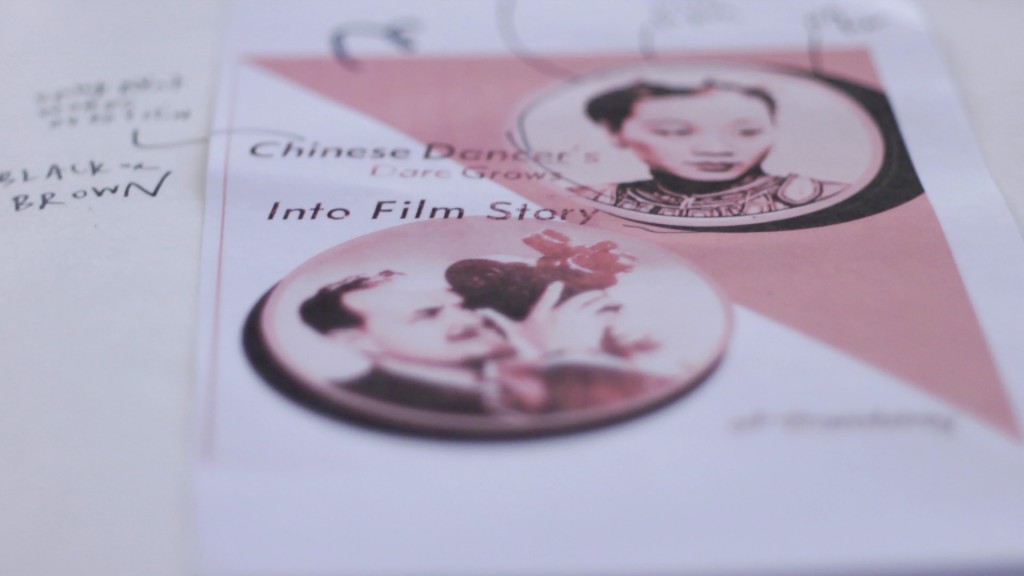
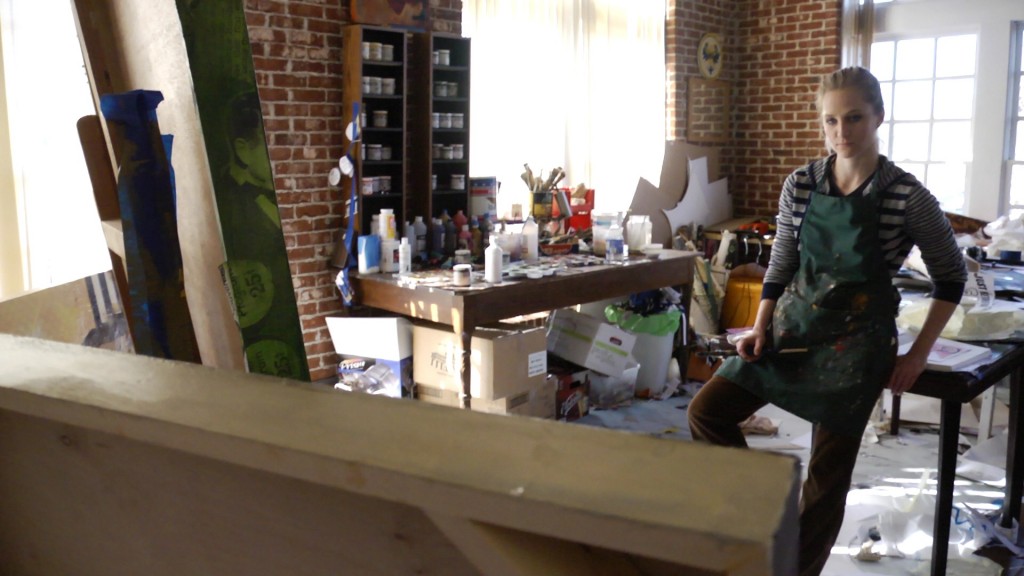
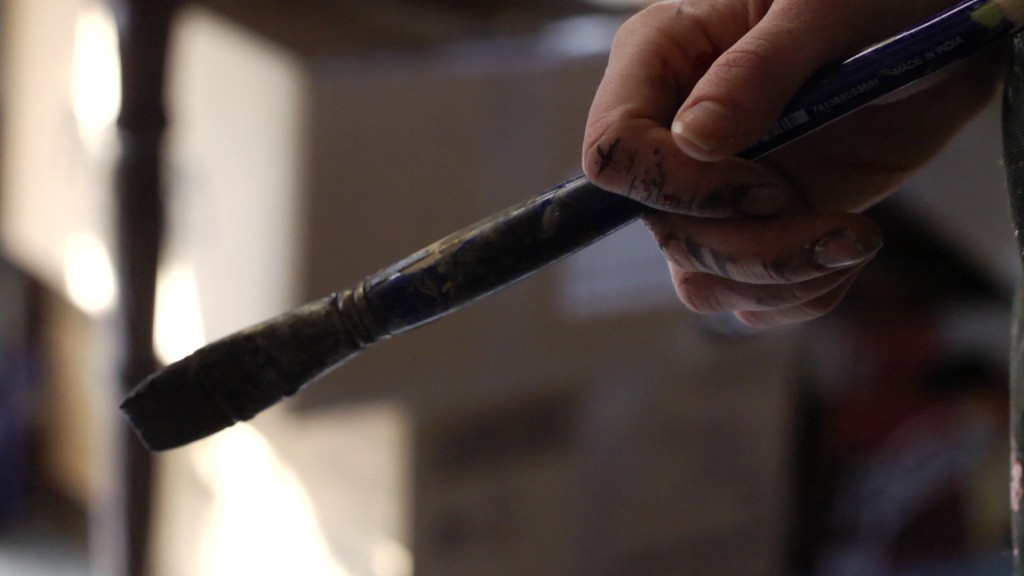
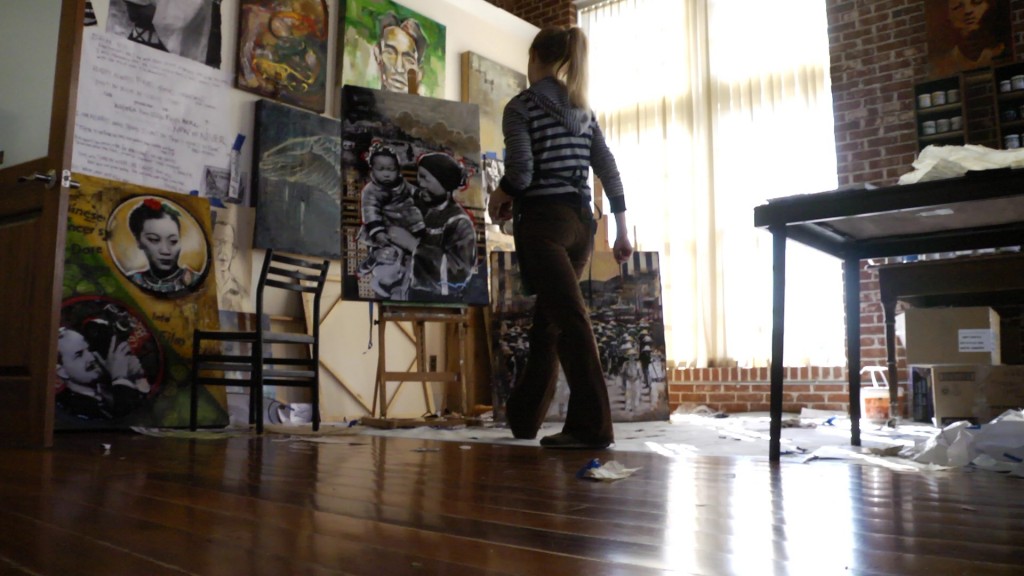
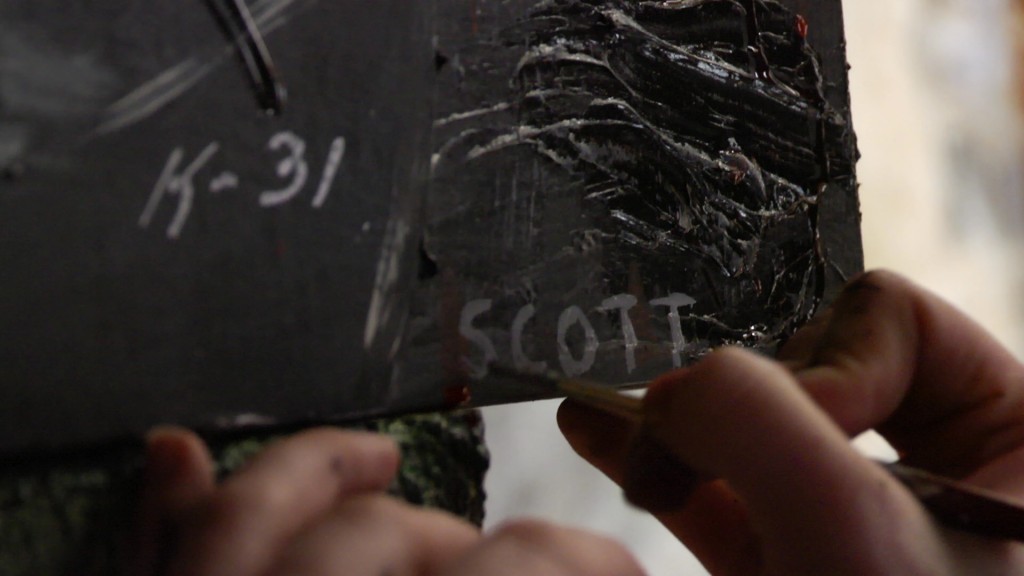
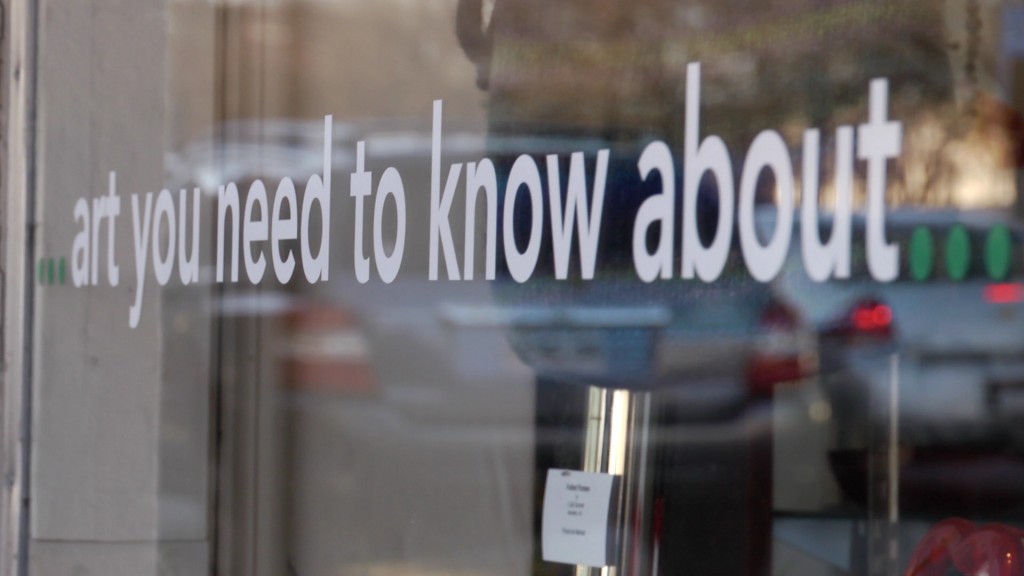
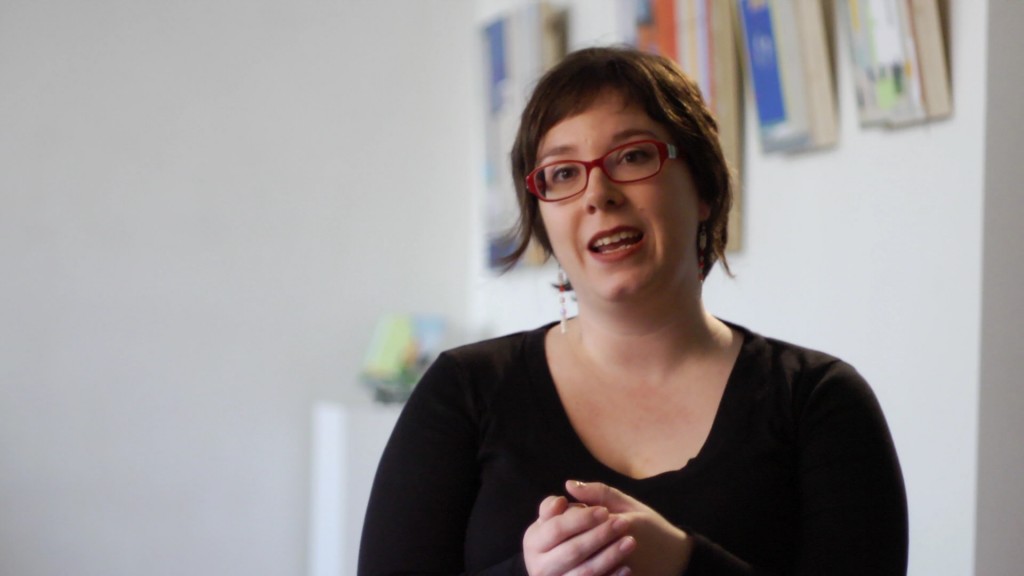
Becky Rule of 2Rules Fine Art
December 5–10, 2011 — LA Production Shoot
My main reason for traveling to LA was to interview Li Ling-Ai’s nephew Andrew Li who was a young boy of 8, living in Nanking when Rey Scott and Li Ling-Ai began pre-production for KUKAN.
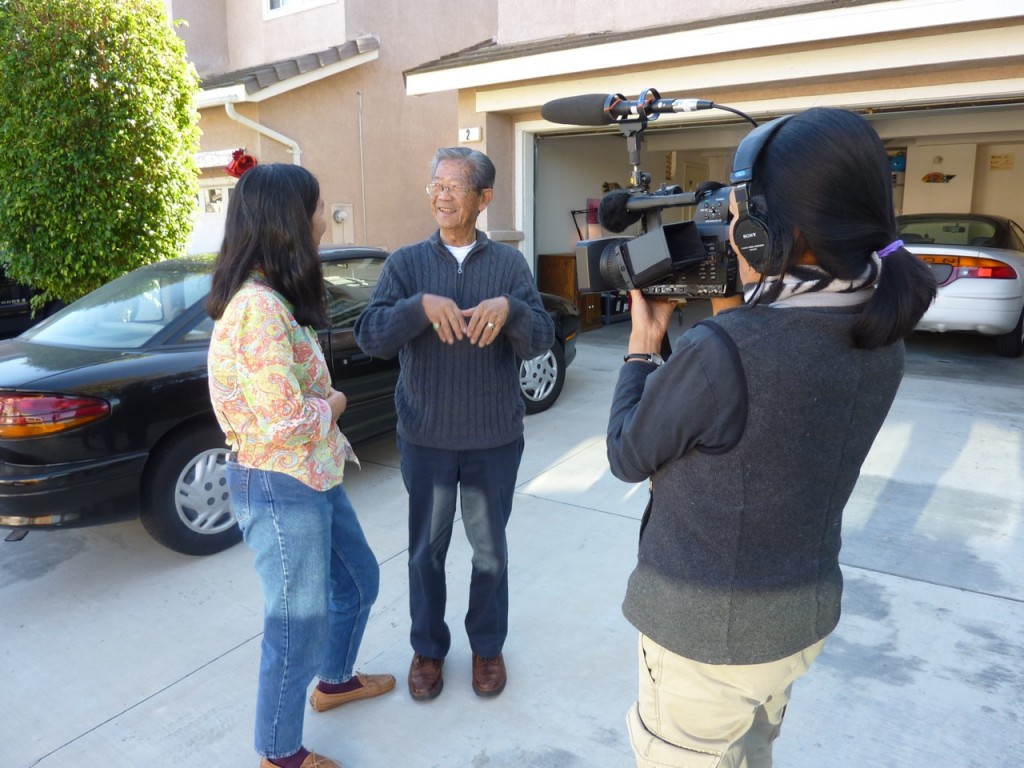
Ann Kaneko films FINDING KUKAN director Robin Lung meeting with Li Ling-Ai’s nephew Andrew Li.
I hoped to find out more information from Andrew about Ling-Ai’s connections in China at the time. Though I was able to gather some valuable information from my interview, the 5 days in LA turned out to be about so much more — a lot of it behind the scenes stuff that will never make it into the documentary.
Getting to know the talented filmmaker Ann Kaneko was one of the unexpected bonuses of the trip. Thanks to generous donations from early FINDING KUKAN supporters, I was able to hire Ann for a couple of days as my LA Director of Photography. Having a dp with a real interest in the project and experience with both editing and being a character in her own films was invaluable.
Witnessing Ann balancing her dedication to her work with the demands of raising her 8‑month old daughter Ceiba was a real inspirational shot-in-the-arm too.
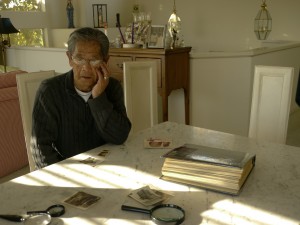
Andrew Li inspects photographs
As I lunched with Andrew Li, his daughters Portia and Quincy, and his wife Gilda I got a sense of the rich life Li Ling-Ai had beyond KUKAN and the profound ripple effect that personal stories can have through time and space.
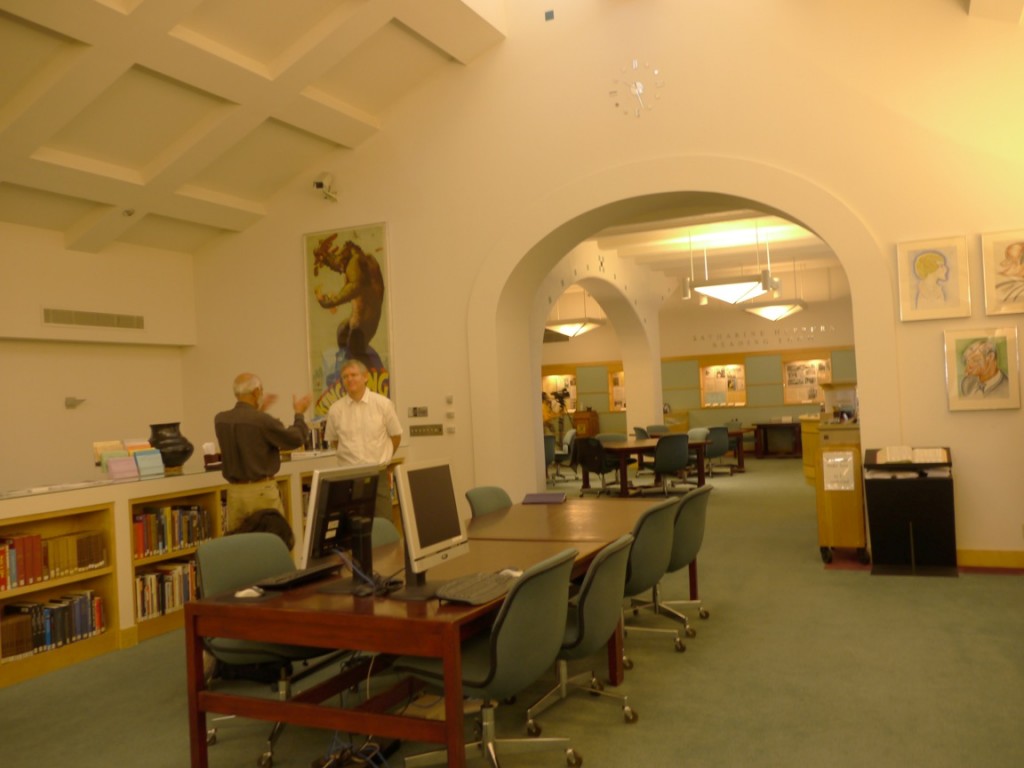
John Zainer talks to Ed Carter in front of the $500,000 King Kong poster that decorates the Margaret Herrick Library’s reading room.
Filming B‑roll scenes of Ed Carter at the Margaret Herrick Library introduced me to this gorgeous building and amazing film history resource for the first time (I am already thinking of excuses to return to spend more leisurely hours there).
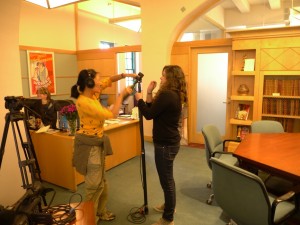
Ann Kaneko and Rebecca Bozzo prep for a shoot at the Margaret Herrick Library
It also gave me an excuse to hook up with the perennially upbeat Rebecca Bozzo again. Becca is a dedicated young filmmaker who shares a passion for old movies and has been a FINDING KUKAN supporter from almost day one.
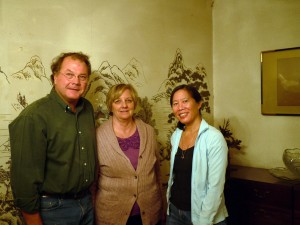
Dan & Denise Levenick with Robin Lung
Dan & Denise Levenick invited me to their home in Pasadena to view their mother’s home movies and photographs of 1930s Hawaii. Besides giving me another reason to marvel at the generosity and kindness of strangers, Dan and Denise provided me with precious “before-my-time” knowledge of my home town.
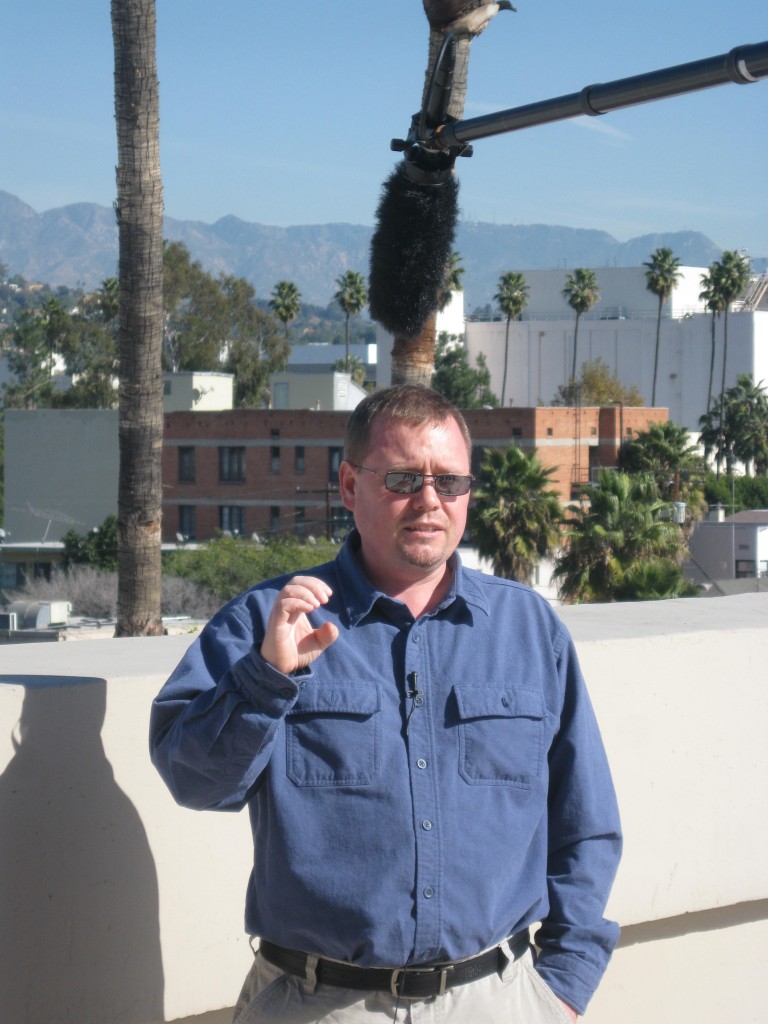
AMPAS Preservationist Joe Lindner describes how curled the KUKAN film print is.
Talking to AMPAS Presrevationist Joe Lindner about the arduous process of restoring KUKAN gave me new insights into the precious nature of old film, the historic value that even old home movies have, and the galling number of films that have been destroyed by time.
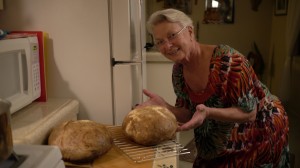
Ille-Heid Zainer and her fresh baked bread.
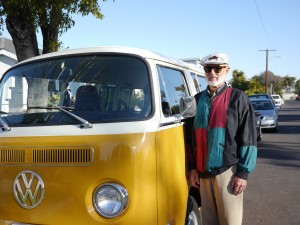
John Zainer’s 1971 VW Van was the perfect LA production vehicle.
Finally my hosts in LA, John and Ille-Heid Zaner, provided me with an intimate view of what living in LA can be like, inviting me to neighborhood parties, providing home-cooked meals after long days of shooting, chauffering me around in vintage vehicles, and sharing Ille’s sister Elke’s amazing Christmas cookies with me.

Elke’s Cookies
The result is that after my 5‑day production shoot in LA, a city that I once had a very low opinion of, I can’t wait to go back.
December 1 to 31, 2011 — Producer/Director Robin Lung Featured on Career Changers TV
Although I’m more comfortable being behind the camera than in front of it, I agreed to be profiled on OC 16’s Career Changers TV show in order to get the word out about FINDING KUKAN. Producer Rich Figel and Cameraman/Editor Stan Chang managed to boil my life of job-hopping down to a succinct 4 minutes or so. Even better, the lead in and out of the piece made people really want to see the work-in-progress trailer and learn more about KUKAN. The show airs through December on digital channel 16 or 1016 in Hawaii. The show is rebroadcast Fri 2:30pm, Sat 6:30pm, Sun 12:30am, Mon 9:00am, and Wed 2pm and Thur 8:30pm through December. If you can’t catch it, here is a low resolution version.
You can see the nice lead up to the trailer here. And a fabulous article Rich wrote about “The Mystery of Li Ling-Ai” here.
October 19, 2011 — FINDING KUKAN Excerpts Screen at Evening with Jiang Wen
Two work-in-progress excerpts from FINDING KUKAN (one in its first public showing) will screen as the “opening act” for the University of Hawai‘i sponsored Evening with Jiang Wen, the famous Chinese actor/director who is in Hawai‘i as the featured filmmaker for the 2011 Hawai‘i Intternational Film Festival.
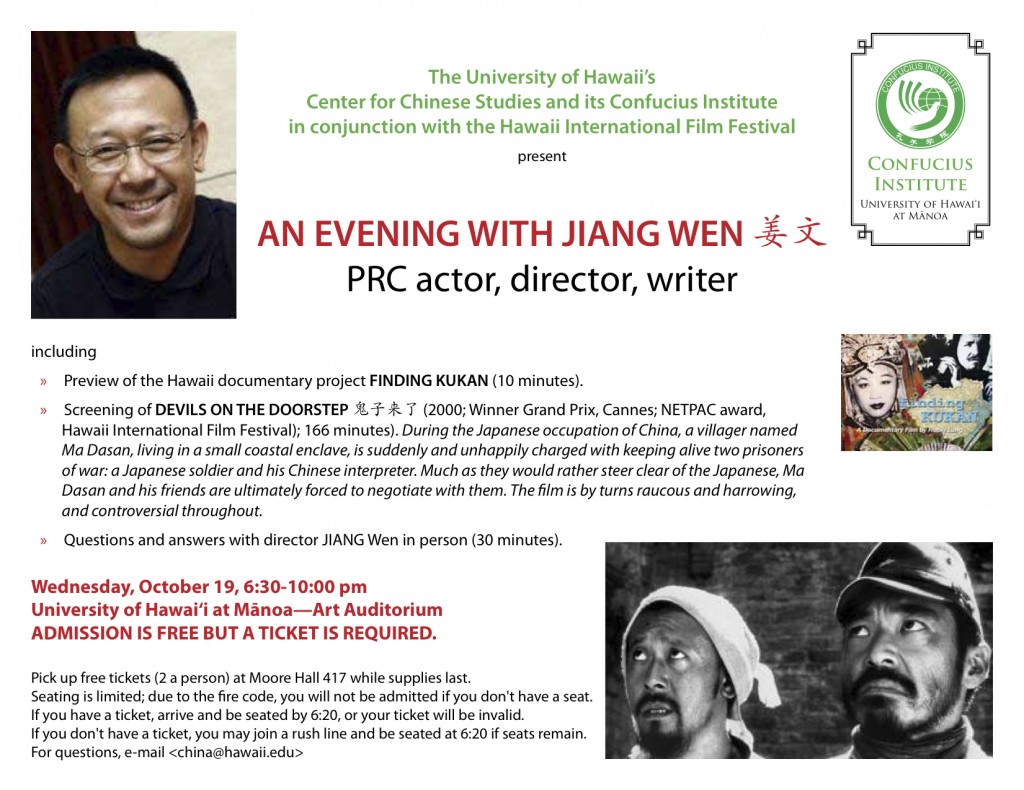
Flyer for FINDING KUKAN Screening at University of Hawai‘i sponsored Evening With Jiang Wen
The evening should be a very special one, and bound to bring great exposure to FINDNG KUKAN. Check it out if you are in the area.or pass the word on to others. Note that the screening is free, but you need a ticket to get in the door. They expect a capacity crowd, so get your tickets early. They are available at UH Moore Hall 417.
October 3, 2011 — Crafting Story with Editor Shirley Thompson
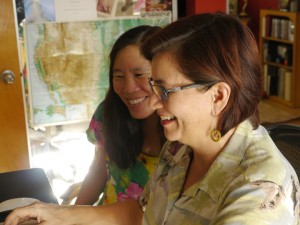
Robin Lung & Shirley Thompson view FINDING KUKAN footage
When I first met Shirley Thompson back in June, I was already a fan of her work and instinctively knew that she would be a great long-format editor for my project. So I was thrilled when, at our next meeting, she voiced enthusiasm for FINDING KUKAN and agreed to edit the project once it got to the post production stage (assuming that schedules, financing, and all the other variables of documentary production work out).
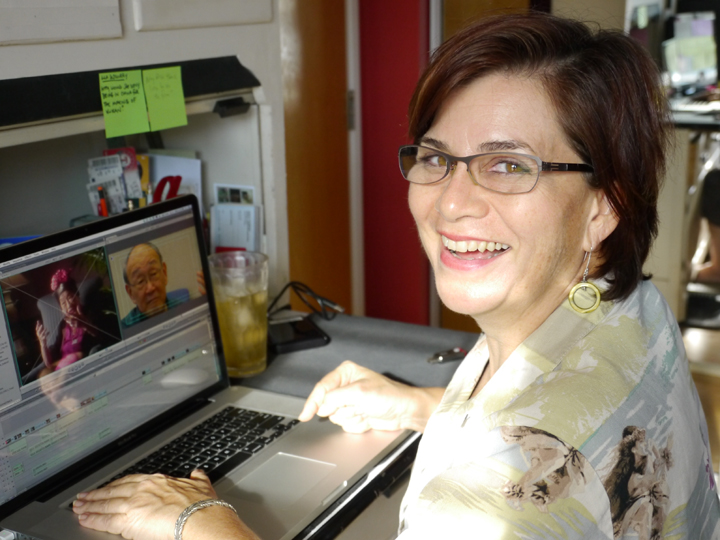
Shirley Thompson edits FINDING KUKAN footage
When I needed an additional few minutes of footage cut for a grant application, I was very thankful that Shirley was available for a few days to help me out. I’m happy to say that my instincts were correct. Not only was Shirley a joy to work with — providing a beautiful, airy workspace; 2 cats to pet; and incredible chocolate snacks — she helped me sort through the small mass of footage I’ve collected so far and turn it into manageable chunks of story that added up to something really exciting.
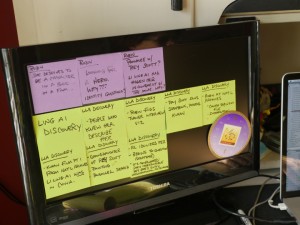
Shirley creates beautiful post-it storyboards to help structure the edit session.
The result was that I was much clearer in my head about the kind of story I wanted to tell with FINDING KUKAN. And I was more confident about what I needed to film next to follow that story.
Shirley really is a story doctor. And I’m more motivated than ever to complete production and get back to the editing room with her. It’s an exhilirating experience.
July 23, 2011 — A Visit to the New York City Office of the National Archives
When I first started checking to see if Li Ling-Ai could have been the real life inspiration for the fictional detective Lily Wu, I tracked down some of her travels through boat records that are available on Ancestry.com. One of the Ancestry records was a New York Exclusion file that listed the date of her arrival in San Francisco. Going over the notes on the record again, I saw that Li Ling-Ai’s file included an interrogation. Since the interrogation occurred only a year before Li Ling-Ai met Rey Scott and conceived of making the movie KUKAN, I was anxious to read through the interrogation to see if it contained any clues. In July I finally got a chance to visit the NYC office of the National Archives where Li Ling-Ai’s Exclusion file is located.
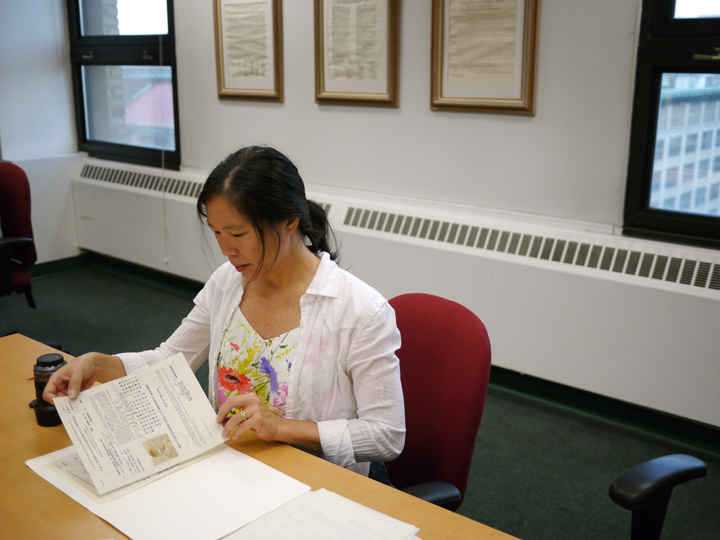
Robin Lung examines Li Ling-Ai’s Chinese Exclusion File at the NYC office of the National Archives
It was amazingly well-preserved, and I had a lot of mixed emotions while examining it. On the one hand, I was excited to see a photograph of Li Ling-Ai in the file that I had never seen before and letters that were hand-written by her. Handling the documents gave me a very visceral connection to the past and to this woman that I have been pursuing for the last couple of years.
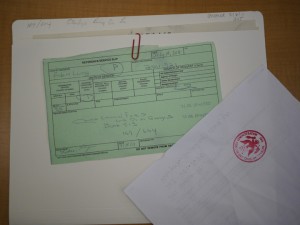
Li Ling-Ai’s Chinese Exclusion File
On the other hand I was appalled that this file existed in the first place. I had to think about the blatant anti-Chinese discrimination that led to The Chinese Exclusion Law — the reason for the creation of the file I was touching. I was astounded that a U.S. citizen like Li Ling-Ai (she was born in Hawai‘i in 1908 when it was already a U.S. Territory) who had a U.S. Passport (documented in the file) would have to spend days at the NYC Immigration Office in order to get a re-entry form that would make it possible for her to come back to her own country after leaving it! And that she would have to sit through an interrogation to prove that she was authentic despite all the other documentation she had made me even more indignant.
As a researcher, I was thankful to be able to access the revealing information in the file and draw both the positive and negative energy from it. So I have to acknowledge the hard work that goes into indexing, storing and retrieving these records. That day at the Archives I witnessed two volunteers who were laboriously going through files and entering data into laptops so that others like me could find information about ancestors and characters from the past. I wish I had gotten their names and taken photos of them if only to pay a small homage to all the others like them who have helped forward my investigation.
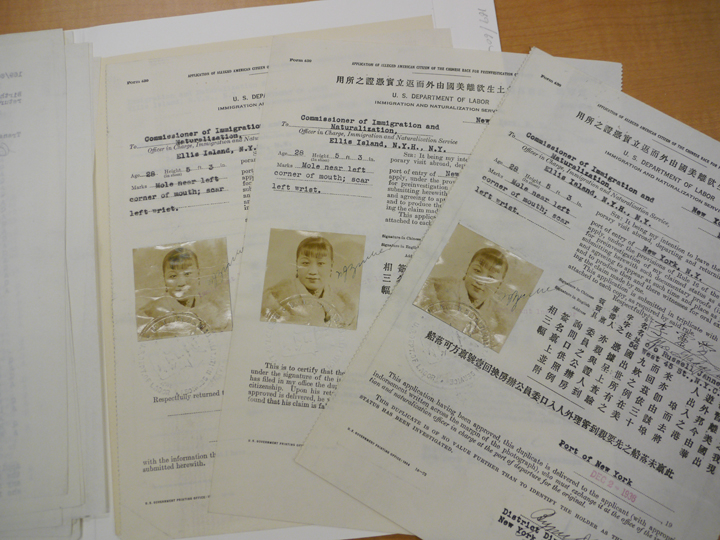
Documents in Li Ling-Ai’s Chinese Exclusion File
July 10, 2011 Preparing for an Independent Shoot & Finding a Great Camera Store in NYC
A couple of months ago I purchased a Panasonic GH2 to take on my trip to NYC and Atlanta so that I could shoot some interviews and footage of artist Michelle Scott — the talented granddaughter of KUKAN cameraman Rey Scott. As with most new cameras, it’s a learn as you go and make mistakes process. The second day in NYC, I had my battery go out in a test interview and got a corrupted mts file on the SD card (techie language for a screwup that you do not want to happen during the real thing). I decided I needed an AC adaptor for the camera — that should be easy enough in the big apple shopping capitol, right?
Surprise, surprise, the two biggest camera stores in Manhattan were out of stock. Fortunately, I discovered Alex & Tony at H & B Digital on 46th Street. Not only did they have the part, but they were the sweetest salesmen that I’ve run across in a long time. They patiently looked up how the adaptor worked, let me test it, and then spent almost an hour advising me about filters and giving me a pep talk about doing a shoot on my own — something I have to face when the budget won’t tolerate hiring a larger crew.
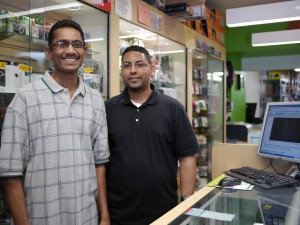
Tony & Alex at H & B Digital
So if you find yourself in NYC with camera needs, check Alex and Tony out on 46th St. They are a small shop, but well-stocked and have great prices too. Most of all they have a passion for photography & filming and seem to love what they do.
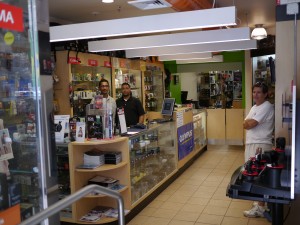
H & B Digital storefront
May 16, 2011 — Bryan Pearson Records Narration for Fundraising Trailer
British stage actor Bryan Pearson stepped in to record a few lines of narration for the Finding KUKAN fundraising trailer currently in its final edit.
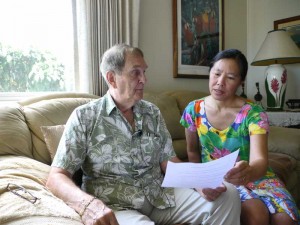
Bryan Pearson and Robin Lung go over lines of narration for the FINDING KUKAN fundraising trailer.
Brian refers to himself as the “original Terminator” since he played Thor in the 1959 cult classic Teenagers from Outer Space under his stage name Bryan Grant.
I found Brian through a fascinating loop of connections that started off when I interviewed war-time Chungking journalist Wing Yung Emery and sister of Choy Wai Chuen, the first Chinese man to play at Wimbledon in 1948. The loop of connection was made possible by the diligence of Chris Essex, webmaster for Framlingham College alumni. Framlingham was the prep academy that Choy Wai Chuen and Bryan Pearson both went to.
Another eye-opening zig in the amazing zig-zag journey I’ve had since finding KUKAN.
January 2011 — Work on the Fundraising Trailer Begins
Cameraman Ron Darby and Producer Robin Lung begin filming interviews and b‑roll in Hawaii for the Finding KUKAN fundraising trailer.

